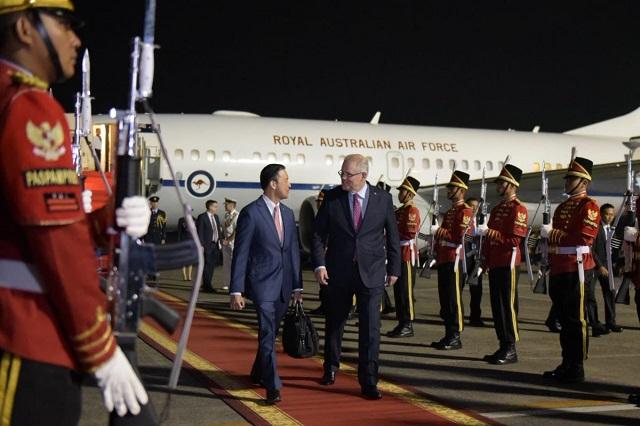
Scott Morrison is on his first overseas trip as prime minister—and it’s to Indonesia.
The immediate purpose is for Morrison and Indonesia’s President Joko Widodo to announce their two countries’ assent to a free trade agreement.
It’s more than that for the new prime minister, though. The fact that he has committed to the Indonesian visit at the very start of his tenure as leader, at a point when the demands for his time and attention are extraordinary, shows the weight he wants to place on the relationship.
The free trade agreement itself is probably not that fundamental a thing. Bilateral trade between Australia and Indonesia is surprisingly light-on at $16.4 billion a year. Despite a shared maritime boundary and a long trail of commitments to strengthen the relationship, we mainly look past one another economically. Indonesia is Australia’s 13th largest trading partner, while Australia ranks 14th for Indonesia—behind Germany, Vietnam and the Netherlands, and just ahead of Pakistan.
Negotiating the deal has taken six long years, much of which has been spent on wrangling over technical issues, like how Australian standards were going to be applied to building and construction supplies. The fact that it wasn’t big threshold issues that took the time shows that neither country’s leadership really saw the agreement as key to its own priorities.
That situation has to change in two ways if Morrison’s symbolic first visit is to be meaningful. Any agenda for the partnership needs to respond to Widodo’s needs and interests, as well as advance Australian national interests. And beyond focusing on common priorities, Morrison will have to invest personal time and effort into the partnership over the course of his prime ministership if he is to undo decades of under-delivery in the Australia–Indonesia relationship.
On common priorities, Widodo wants to be able to conduct maritime surveillance and security operations in Indonesia’s exclusive economic zone, including the northern region around the Natuna Islands in the South China Sea.
It’s absolutely in Australia’s interests for Indonesia to be able to monitor and control its maritime territory. Australia could offer to be involved in joint maritime and air surveillance with Indonesia, and perhaps India, to contribute a joint picture to Indonesia and empower Indonesian sovereignty and control of its northern approaches.
Morrison might also connect those efforts to the government’s defence export strategy.
He could work with Widodo on facilitating partnerships between Australia’s defence industry and Indonesia’s military (the TNI) and defence sector to increase the reliability and availability of Indonesian naval and air systems and platforms, including ships, aircraft, radar, and surveillance pictures.
Australian defence firms have a proven ability to sustain and support systems and platforms from multiple international providers, so selling those services to Indonesia’s military should produce mutual advantages.
A second agenda item flows from Widodo’s core priority of investing in Indonesia’s human capital through education. He understands that investment in higher education will enable Indonesia to sustain high year-on-year GDP growth (currently running at around 5%) and so keep the country moving up the world economic rankings from its current 16th position.
Australia has a world-class tertiary education sector, and Australian universities deliver high-quality higher education to international students here in Australia and in overseas campuses. Chinese students dominate our universities’ international student numbers. This reliance on a single customer group creates substantial business risk for the sector, particularly as China’s own universities expand and mature in quality. Diversifying the student market has been a goal of our universities, but so far they’ve made little progress.
Indonesia’s growing middle class and the Indonesian government’s understanding of the need to invest in higher education provide a great opportunity for Australian universities. They can create a new medium- and long-term partnership with Indonesian universities, boost Indonesian student numbers in Australia, and set up campuses in Indonesia. For both countries’ leadership, this is both an economic and strategic element of our future partnership.
So maritime security and education can form core elements of the partnership, and both elements can use the momentum that comes from completing the free trade agreement. Maritime security is also heartland territory for what seems set to be not just a comprehensive partnership, but—under Morrison and Widodo—a comprehensive strategic partnership.
But success is not simply about getting an agenda that reflects common priorities. Making any of this actually happen beyond the fine words and handshakes is where the hard work starts for Morrison. This is the lesson of history between Australia and Indonesia. To make progress, he will need to be involved closely in driving implementation.
The prime minister will need to insist on solid initiatives to give substance to the partnership, and keep pressure on those responsible for them—in Commonwealth departments, but also in the sectors of the Australian economy that need to deliver. Further visits by the prime minister and senior ministers delivering on the agreed agenda—in the company of defence industry leaders and university leaders—will move beyond symbolism to commitment.
Indonesian leaders have heard pledges from Australian leaders before. They feel they have many options for economic partnerships and they will always make strategic decisions with an eye to preserving Indonesian independence. So, Morrison will need to be the one who works hard to demonstrate results before both he and Widodo face national elections next year.
May this flying visit be the start of a sustained focus at the highest levels of the Australian government on strengthening our strategic and economic partnership with Indonesia. Our defence industry firms and our universities can seize the opportunity provided by Morrison and Widodo so that we see real depth to the relationship in coming years—to the benefit of both our nations.